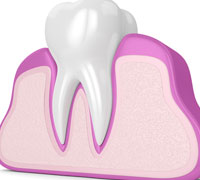Root canal treatment at mydentist
What is a root canal?
Root canal treatment (RCT), also known as endodontic treatment, or simply as root canal is a common dental procedure designed to save an infected tooth from extraction.
During this procedure, the infected pulp within the tooth is carefully removed, the interior of the tooth is cleaned and disinfected, and then filled and sealed to prevent further infection. This treatment aims to alleviate pain, preserve the natural tooth, and restore oral health.
When would I need root canal treatment?
Root canal treatment is necessary when the pulp, the soft tissue inside the tooth, becomes infected or inflamed due to deep decay, or traumatic injury. Without intervention, the infection can spread, causing severe pain, abscess formation, and even bone loss around the tooth. By undergoing a root canal, you can relieve pain, halt the spread of infection and preserve the tooth.
What does root canal treatment involve?
Your dentist will administer local anaesthesia to ensure your comfort during the procedure. Then, they will create an opening in the crown of the tooth to access the infected pulp.
Using specialized tools, the dentist will carefully remove the infected or damaged pulp, clean and disinfect the interior of the tooth, and shape the root canals to prepare them for filling.
Finally, the canals are filled with a biocompatible material and sealed to prevent further infection.
In many cases, a dental crown may be placed over the tooth to provide additional strength and protection. Root canal treatment is usually completed in one or two appointments, depending on the severity of the infection and the complexity of the tooth's anatomy.
Diagnosing an infected tooth
At mydentist, we are proud to offer patients the latest dental technologies to enhance their treatment. These innovations not only improve the precision and effectiveness of treatments but also ensure a comfortable and streamlined experience for patients.
There are several steps your clinician can take to evaluate your dental condition. You will need to undergo an examination and have appropriate x-ray imagery of your dental anatomy captured. Learn more about the advanced technologies we may offer as part of your treatment.
Have you thought about?
Regain confidence in your smile with options available to restore your teeth.
There are several treatments available for restoring your smile such as Oral surgery or Periodontics.
Root canal FAQs
What are the signs that my tooth is infected?
Some of the more common signs of a dental infection are:
- Sensitivity, particularly to hot food and drink
- Pain when biting
- A loose tooth or teeth
- Persistent, localised tooth pain
If you experience any of these symptoms, or are concerned about your dental health, please contact your practice.
Is root canal treatment safe?
Many patients experience some anxiety surrounding root canal treatment. However, root canal treatment is considered a routine procedure and is safe. As with any medical procedure, there is always a small risk of complication, but it is unlikely that you will experience these.
Is root canal treatment uncomfortable?
Root canal treatment normally doesn’t hurt. Your dentist will provide a local anaesthetic to numb the area and minimise any discomfort. If you have any concerns or questions about the procedure, you’ll have the opportunity to discuss them with your dentist before your appointment.
How much does root canal treatment cost?
Root canal treatment is a Band 2 treatment under the NHS. In some cases, following root canal treatment you may need a dental crown which would be a Band 3 treatment under the NHS.
The cost of private root canal treatment can depend on the severity of the infection and your current dental health. However, at mydentist, we strongly believe everyone deserves access to high-quality dental care, which is why we offer flexible finance options and several ways to pay to suit you.
What is the recovery from root canal treatment?
It's important maintain good oral health when recovering from root canal treatment. After your final treatment, your restored tooth may feel sore for a few days. You can take over-the-counter painkillers to relieve any discomfort and return to your dentist if you still have persistent pain or swelling after using painkillers.
What are the success rates of root canal treatment?
The success rates of root canal treatment can vary depending on the tooth that needs treating and the severity of the infection. As a routine procedure, root canal treatment is generally successful. However, problems can occur if the tooth develops decay or the restoration on the tooth fails, or on occasion despite good care and treatment the tooth may not heal as expected. Further endodontic treatment or surgery may be carried out if appropriate. In the case that your root canal treatment does resolve the problem, your dentist will discuss alternative options for treatment with you.




